Quick thinking and a last-minute plan helped 'Oklahoma' become an enduring state song
During his three-decade political career, former Oklahoma Gov. George Nigh worked on, debated over and signed into law innumerable pieces of legislation.
But the memory of one remains particularly sweet, like the smell of waving wheat when the wind comes right behind the rain.
In 1953, Nigh, then a newcomer to the state House of Representatives, introduced legislation to adopt the title theme of the musical "Oklahoma!" as the official state song.
"It's my favorite because it was (for) my love for the state," Nigh, now 96, told The Oklahoman in an August phone interview. "I was concerned deep in my mind and heart that our challenge was the image of the state worldwide. And that stage play and the state song helped change us to a very positive worldwide image."
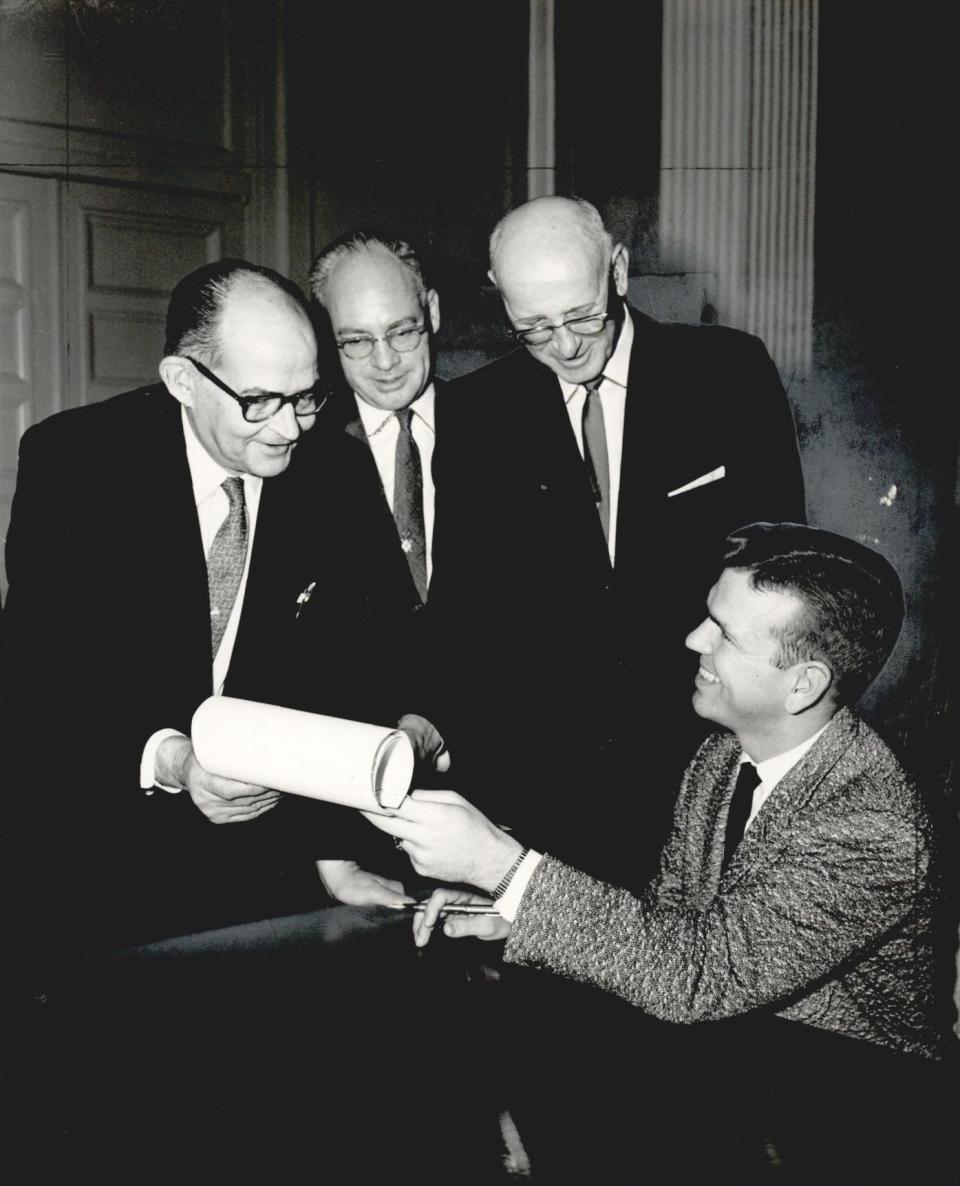
After some political theater worthy of a Broadway stage, Nigh's bill to make the sweeping anthem "Oklahoma" the new state song officially went into effect 70 years ago, on Sept. 5, 1953.
Seven decades later, Richard Rodgers and Oscar Hammerstein II's rousing tribute to a place with "plen'y of heart and plen'y of hope" is still probably the most recognizable state song in the country.
"I think we've got one of the only state songs that plays at ... all the sporting events. Every school sings it at one time or the other," said Larry O'Dell, state historian for the Oklahoma Historical Society.
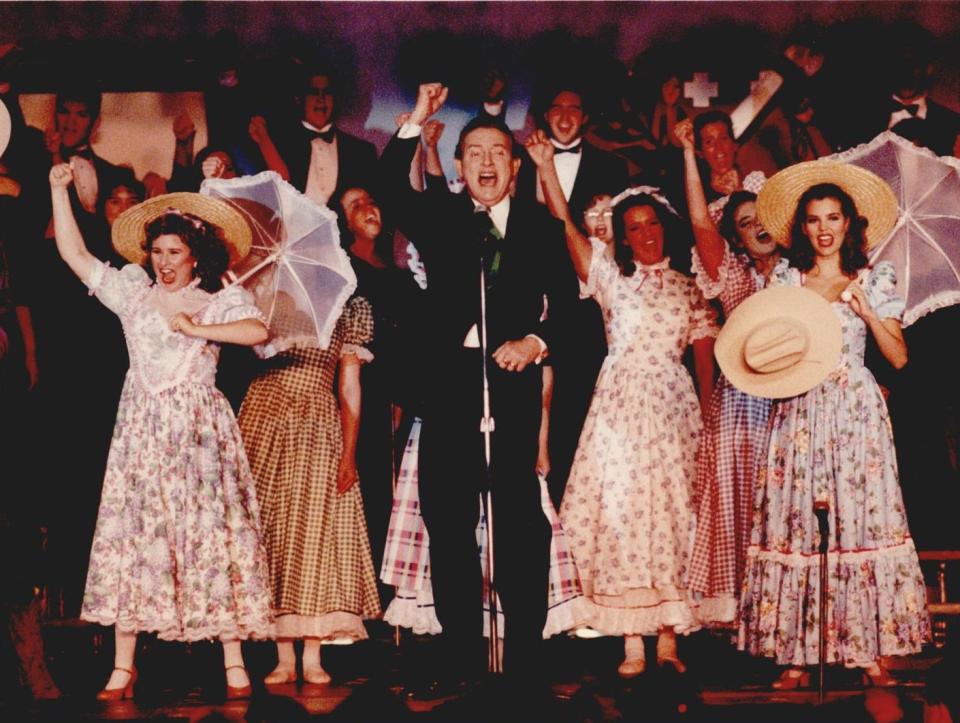
State song's 70th anniversary coincides with the 80th anniversary of the iconic musical
The 70th anniversary of "Oklahoma" becoming the state song happens to coincide with the 80th anniversary of the iconic musical's Broadway debut.
When "Oklahoma!" bowed on Broadway on March 31, 1943, it was an instant smash, launching a record-setting five-year run of 2,212 performances and earning a special Pulitzer Prize for its now-legendary creators Rodgers & Hammerstein.
Adapted from Claremore native and Cherokee Nation citizen Lynn Riggs' play "Green Grow the Lilacs," "Oklahoma!" is now considered one of the most influential musicals ever produced. Jeffrey Moore, executive director of the under-construction OKPOP Museum in Tulsa, calls it "the 'Hamilton' of its day."
"The songs from the musical are ubiquitous now, and you can't separate those songs and that play and the subsequent (1955) film from people's imaginations of what Oklahoma is supposed to be," Moore said.
The show's soaring songs like "Oh, What a Beautiful Mornin'," "The Surrey with the Fringe on Top" and the title theme were so popular that "Oklahoma!" became the first Broadway musical to record an original cast album. Added to the Library of Congress' National Recording Registry in 2003, the 1943 recording made more than $1 million, landed several hits on the Billboard charts and has never been out of print.
"In 1943, I was a sophomore at McAlester High School, and on a Saturday night, I was studying for a test that would come up Monday. ... I had the radio on and was listening to the Lucky Strike ‘Hit Parade.' They counted down the 10 most popular songs in America, and at No. 1, they rolled the drums, and they started playing 'Oklahoma.' I stopped studying, and I said, 'Well, they're singing about my state,'" Nigh recalled.
"And I just fell in love with the song."
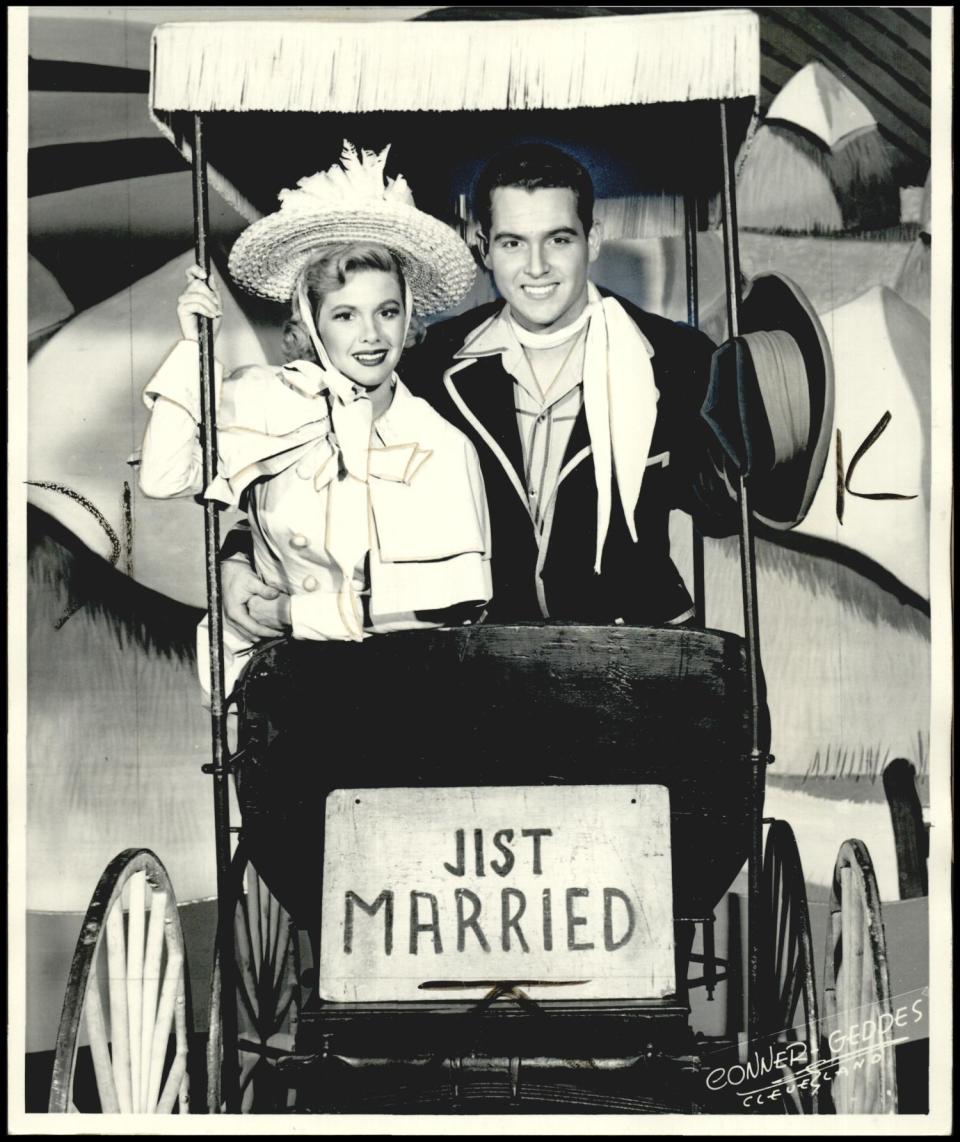
1953 bill to make 'Oklahoma' the state song stirs political drama
In 1950, while a senior at Ada's East Central University, Nigh was elected to the state House of Representatives. He was the youngest member of the Oklahoma Legislature that convened for the 1951 session, so young that he was often mistaken for a high school page.
Back then, the state Legislature met every other year. So, Nigh also had a job teaching history at McAlester High School, taking a leave of absence when the state House convened.
During his second term in 1953, Nigh introduced the bill to adopt the title theme of "Oklahoma!" as the official state song.
"I just thought it would go over real special," Nigh recalled. "It was the most popular Broadway show in the world ... and the most popular song in the world."
Instead, House Bill 1094 provoked plenty of drama because Oklahoma already had a state song: Harriet Parker Camden, of Kingfisher, had penned "Oklahoma, A Toast" in 1905, and it had been named the state song in 1935.
"If you've ever heard it ... it's a dirge. It's boring," O'Dell said.
But "Oklahoma, A Toast" had seniority, plus it had been written by an Oklahoman. Nigh quickly learned that Camden's ode had some passionate fans in the state Legislature.
"A state representative from Ada got up ... and started singing the old state song. And the legislators stood because it was the official state song. Then, he started walking on the floor of the House ... and crying while he sang," Nigh recalled.
"I realized I wasn't gonna be able to pass the bill. So, I got up and said, 'Mr. Speaker, I move that we lay over this bill for one legislative day.' I didn't want to vote then, because I knew I was going to lose."
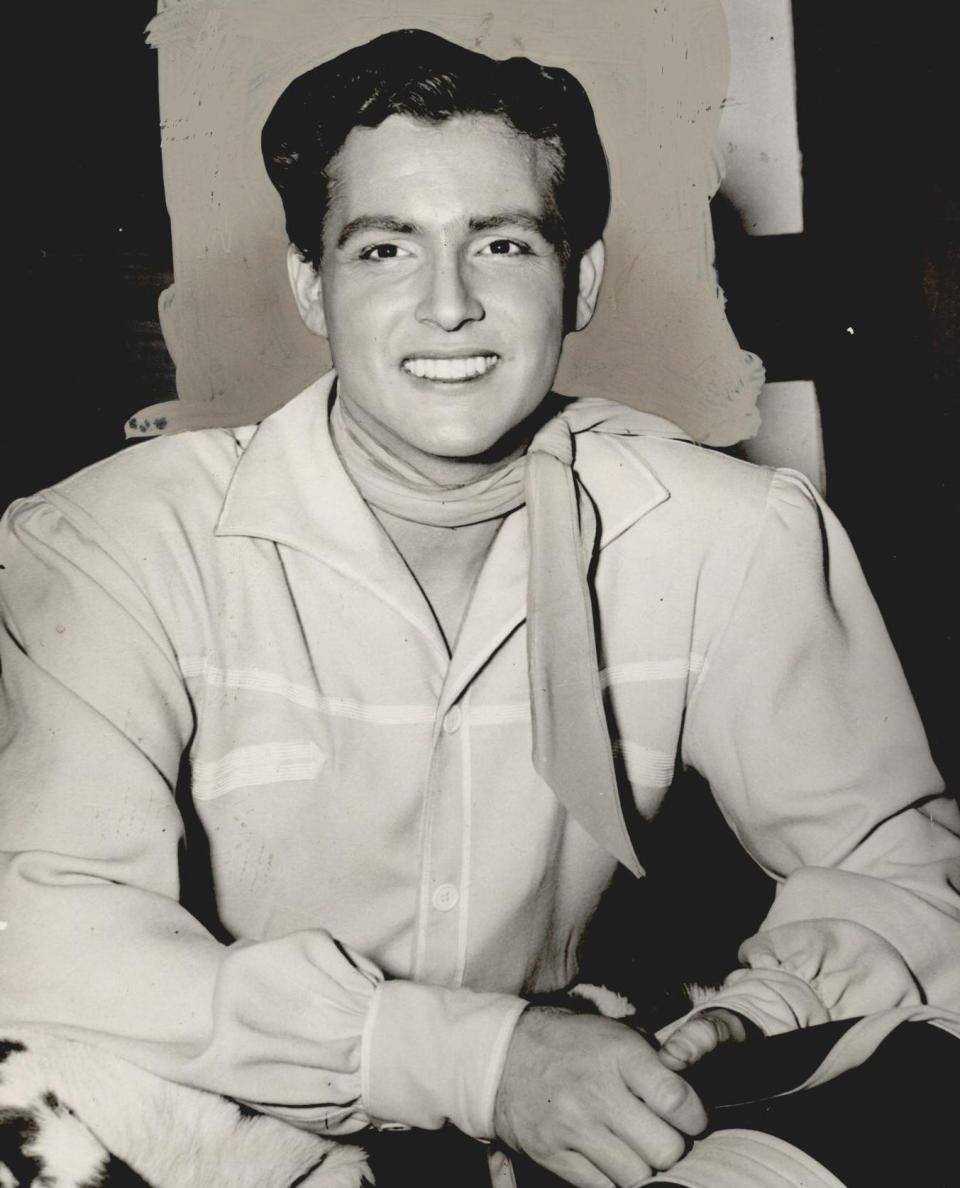
'Oklahoma!' Broadway star changes legislators' tune
No one objected to the one-day delay, and Nigh knew he had to act fast to salvage his plan to make "Oklahoma" the state song. He immediately made a call to Chickasha's Oklahoma College for Women — now the University of Science and Arts of Oklahoma — and asked if there was a choir there that could sing selections from "Oklahoma!"
"They said, 'We just got through performing it at the university,' and I said, 'OK, I want them here tomorrow in full costume,'" Nigh recalled.
His next call was to Ridge Bond, a fellow McAlester native who had grown up with Nigh's older brothers.
A Choctaw Nation tribal member, Bond was the only Oklahoman to play the starring role of Curly McLain in the long-running original Broadway production of "Oklahoma!" Bond took over the role in 1946 from Howard Keel and went on to star in more than 2,600 performances of the musical on Broadway and on international tour.
A University of Tulsa graduate, Bond had settled back in Tulsa by the time Nigh called to ask a favor.
"I said, 'Ridge, you still got any of that crap you wore when you were on Broadway?' That's the direct quote I used, and he said, 'Yes.' I said, 'I want you to put it on tomorrow and come over and sing the song 'Oklahoma' with the choir from the Oklahoma College for Women," Nigh recalled. "He said, 'Are we gonna rehearse it?' And I said, 'No, you're just gonna come over and sing it with them.' He said, 'OK, I'll be there.'"
Working a deal with Jenkins Music Co. in Norman, Nigh arranged for a piano to be delivered to the Capitol the next day, then made sure the House gallery would have a full house for the show.
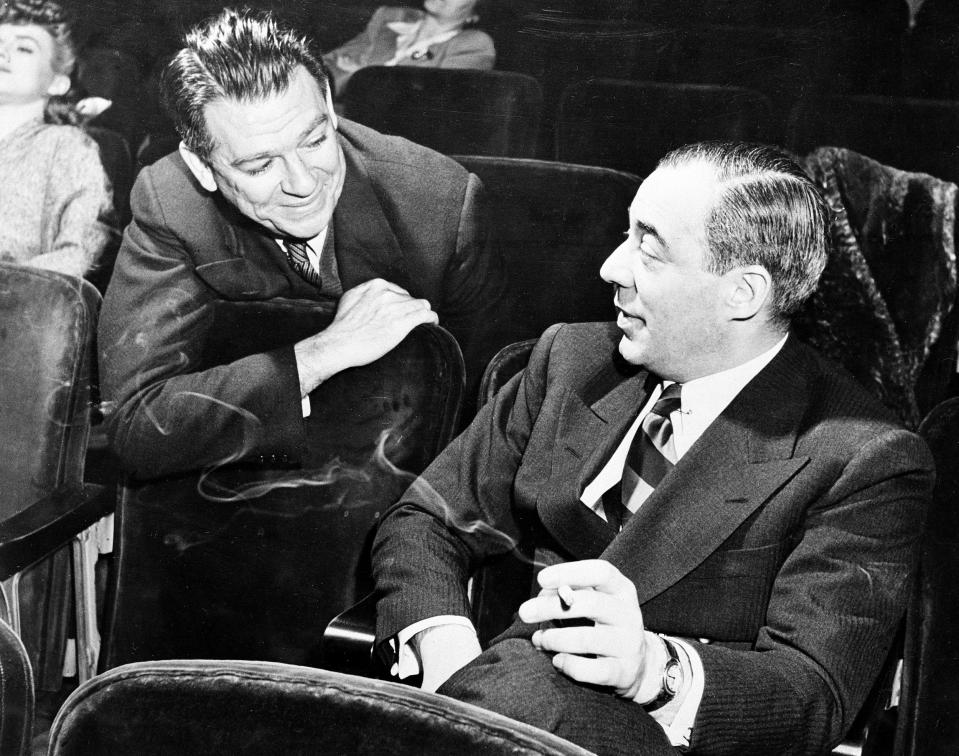
House floor show brings representatives around to 'Oklahoma'
The next day, Nigh got permission to have the women's college choir perform on the House floor. The students warmed up the legislators with a selection of songs from "Oklahoma!," but Bond was nowhere to be seen.
"The piano started rolling up the keys on the 'bah, bah, bah, boom,' and Ridge kicked open the legislative doors. He had his hand on his belt buckle and a cowboy hat on ... and sang 'Oklahoma.' And the entire Legislature stood and started clapping and keeping time," Nigh recalled.
"The gallery was full with over 300 people, and they all stood ... and started singing and clapping and cheering. They ended it, 'Oklahoma, OK' after they spelled it. And I got up and said, 'Mr. Speaker, I move for passage of the House bill,' gave the number, and they called the roll. And they passed the bill."
When Gov. Johnston Murray signed the bill, he gave the pen he used to Nigh.
"I left his office at the Capitol and went to McAlester. ... The spring choral concert at McAlester, where I taught school, was the first place that it was ever performed after the governor signed," Nigh said. "I conducted 'Oklahoma' ... using the pen that he had used to sign the bill into law that very day."
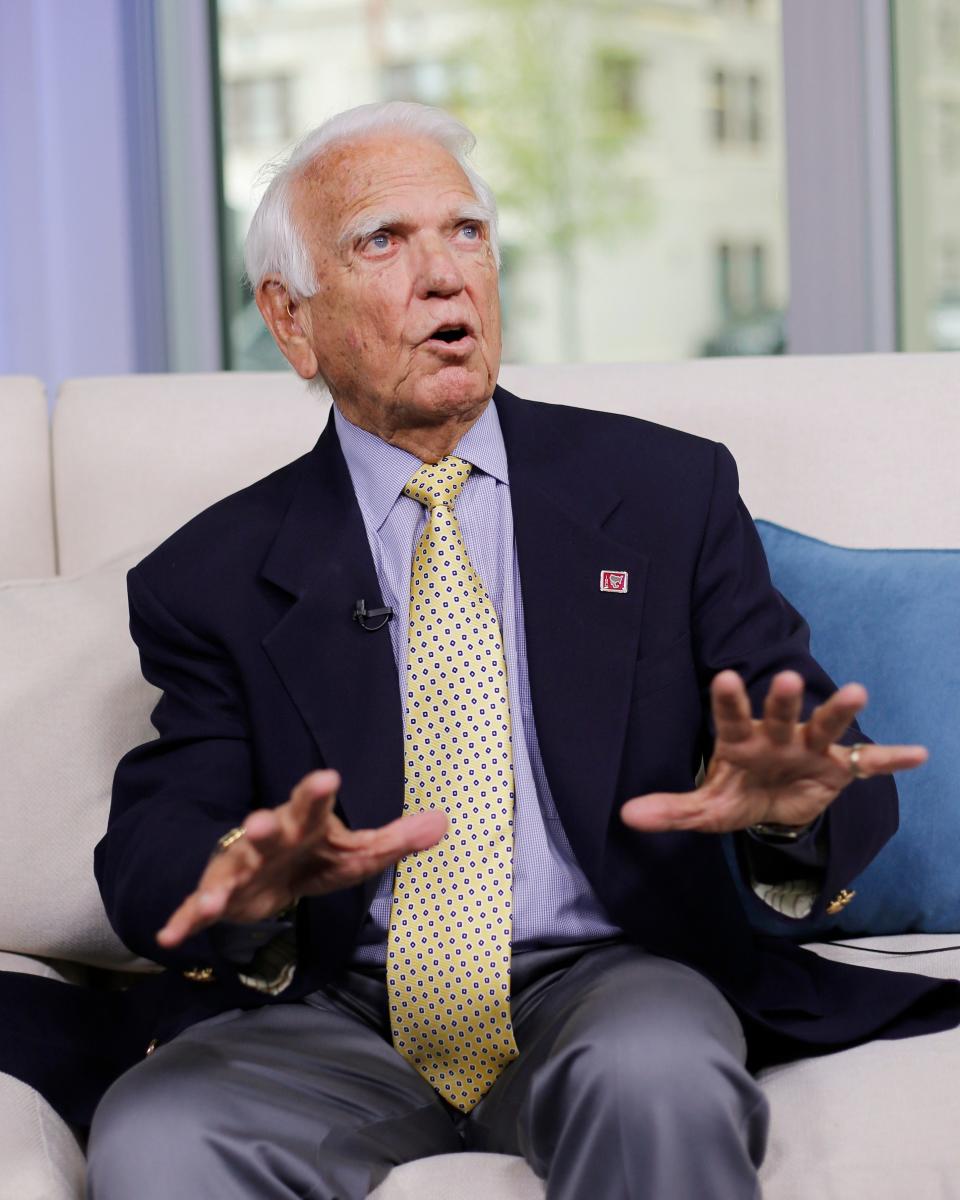
Choctaw Nation celebrating 'Oklahoma!' star Ridge Bond
Since, the uplifting anthem and the iconic musical that birthed it haven't stopped charming audiences in the Sooner State and around the world.
"'Oklahoma' is such a favorite because it harkens (to) the pioneer spirit in so many people, which invokes so much pride, especially in Oklahomans. Pride and the perfect blend of such great music will keep it a classic for years to come," Choctaw Nation Chief Gary Batton said in an email.
To mark the 80th anniversary of the show and the 70th anniversary of "Oklahoma" becoming the state song, the Choctaw Nation is honoring Bond on Sept. 4 during the video presentation of the 2023 Choctaw State of the Nation address, part of the Choctaw Nation Labor Day Festival.
Bond, who died in 1997 at the age of 74, maintained a lifelong connection to the musical. When the U.S. Postal Service issued a commemorative stamp in 1993 for the 50th anniversary of "Oklahoma!," the image was based on a photo of Bond as Curly.
"Ridge paved a path in an arena in which Native Americans have long been underrepresented. Plus, his talent needs to be celebrated and appreciated, regardless of heritage," Batton said.
State song continues to bring a sense of pride to Oklahoma
Beset by the Dust Bowl, Great Depression and World War II, the musical's success brought a sense of pride to the state.
"It was really something that portrayed the state in a positive way," said Oklahoma Historical Society Executive Director Trait Thompson. "The title song is a positive song. It's a fun song. It's a song that you just can't help but sing along with."
Since Nigh went on to become the youngest lieutenant governor in state history and the only Oklahoma governor to serve four terms, he's had many opportunities to travel around the world touting the Sooner State. He still has the pen used to sign the bill making "Oklahoma" the state song, and he's often used it as a conductor's baton, turning many of his speaking engagements into sing-alongs.
"One time, I was in Hong Kong, and my host came in late. I'd never met him ... and he went directly to the podium and said the only thing he knew about Oklahoma was what he read in 'The Grapes of Wrath,'" Nigh recalled.
"I got up to make my remarks, and I sang 'Oklahoma' — and the audience clapped with me. ... So, I believe the song has made a difference."
This article originally appeared on Oklahoman: 'Oklahoma' has been the state song for 70 years — but it almost wasn't
